Friction
Friction: Overview
This Topic covers sub-topics such as Friction, Static Friction, Angle of Repose, Coefficient of Friction, Angle of Friction, Kinetic Friction, Laws of Friction, Coefficient of Kinetic Friction, Friction on Inclined Plane and, Friction on Single Block
Important Questions on Friction
Starting from rest, a body slides down a inclined plane in twice the time it takes to slide down the same distance in the absence of friction. The coefficient of friction between the body and the inclined plane is
The upper half of an inclined plane with inclination is perfectly smooth while the lower half is rough. A body starting from rest at the top will again come to rest at the bottom if the coefficient of friction for the lower half is
Find the value of pushing force just to move the block. If the coefficient of friction between block and floor is given as
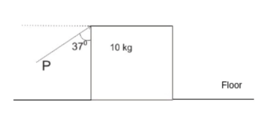
Blocks and shown in the figure are connected with a bar of negligible weight. and each has mass , the coefficient of friction between and the plane is and that between and the plane is. What is the total force of friction between the blocks and the plane
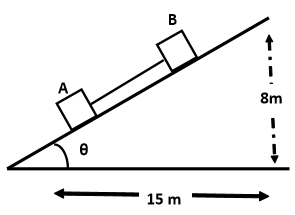
What does the slope of the graph of friction force versus normal force represent?
The minimum force required to start pushing a body up a rough (frictional coefficient ) inclined plane is while the minimum force needed to prevent it from sliding down, is If the inclined plane makes an angle with the horizontal such that , then the ratio is
In figure, the coefficient of friction between the floor and the block is . The coefficient of friction between the blocks and is . The mass of is and of is. What is the maximum horizontal force can be applied to the block so that two blocks move together?
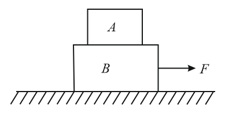
A block of mass is placed on rough horizontal surface whose coefficient of friction is If a horizontal force of is applied on it, then acceleration of the block will be
A massive platform of mass is moving with speed At a body of mass is gently placed on the platform. If coefficient of friction between the body and platform is and Then, the distance covered by body is
Two blocks and of equal masses are released from an inclined plane of inclination at . Both the blocks are initially at rest. The coefficient of kinetic friction between the block and the inclined plane is while it is for block . Initially the block is behind the block . At what time in seconds will their front faces come in a line, (Take )
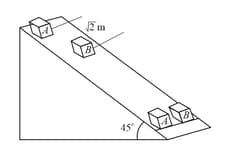
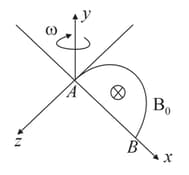
A solid hemisphere rests in equilibrium on a rough ground and against a smooth wall. The curved surface touches the wall and the ground. The angle of inclination of the circular base to the horizontal is , The minimum coefficient of friction required between ground and hemisphere is . What is the value of ?
Two blocks and are as shown in figure. The minimum horizontal force applied to the block for which slipping just begins between and ground is :

A box is kept on an inclined plane making an angle from the horizontal and coefficient of friction . If is the minimum force required to start pushing it above the plane and to prevent it from sliding. Find the ratio if .
A motor cyclist rides around the well with a round vertical wall and does not fall down while riding because
In figure, the coefficient of friction between the floor and the block is . The coefficient of friction between the blocks and is . The mass of is and of is. What is the maximum horizontal force can be applied to the block so that two blocks move together?
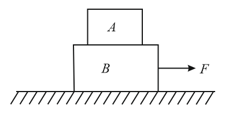
A block of mass is held against a rough vertical wall by pressing it with a finger. If the coefficient of friction between the block and the wall is and the acceleration due to gravity is , the minimum force required to be applied by the finger to hold the block against the wall is:
A block of mass is placed on rough horizontal surface whose coefficient of friction is If a horizontal force of is applied on it, then acceleration of the block will be
When a body slides down from rest along a smooth inclined plane making an angle of with the horizontal. It takes time . When the same body slides down from rest along a rough inclined plane making the same angle and through the same distance, it takes times , where is some number greater than . The coefficient of friction between the body and the rough plane is
A block of mass rests on a rough inclined plane. The coefficient of friction between the surface and the block is . At what angle of inclination of the plane to the horizontal will the block just start to slide down the plane?
